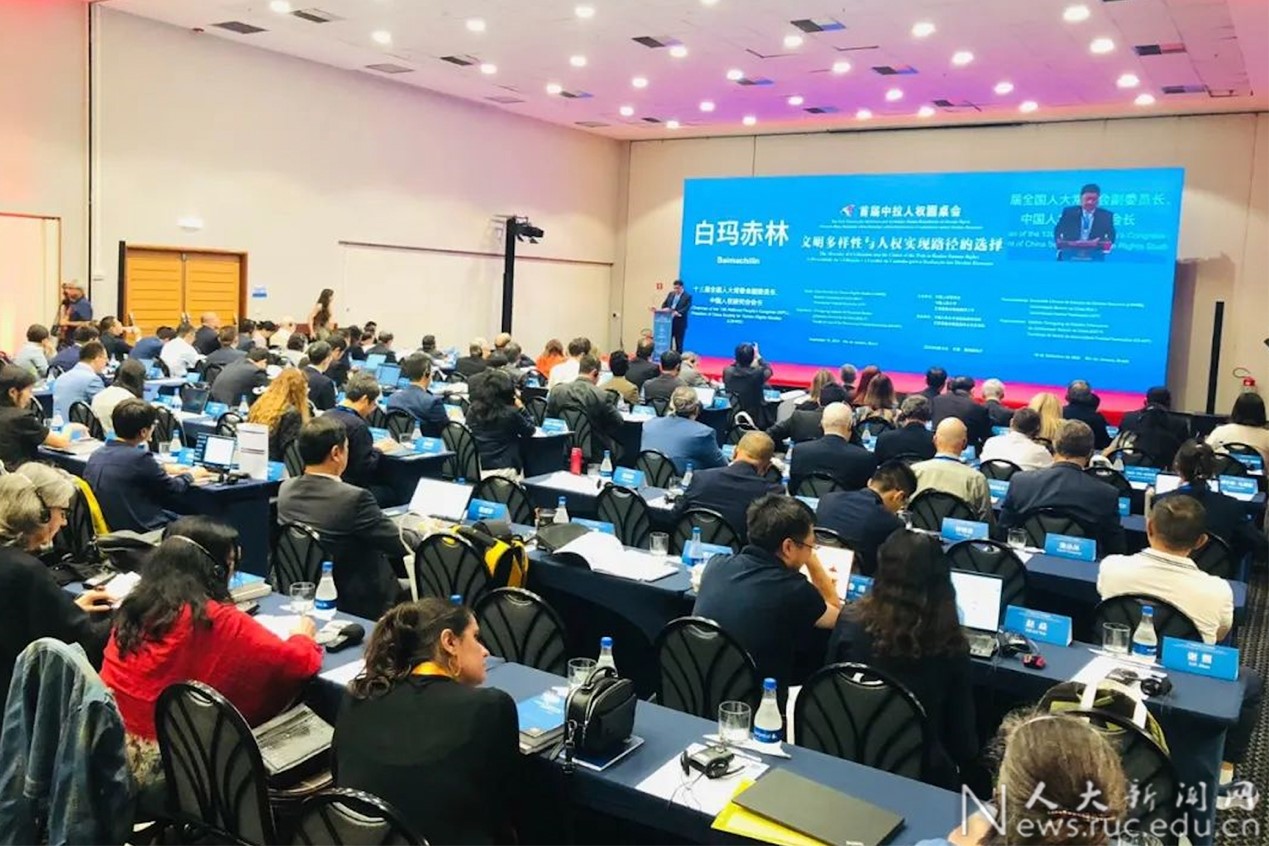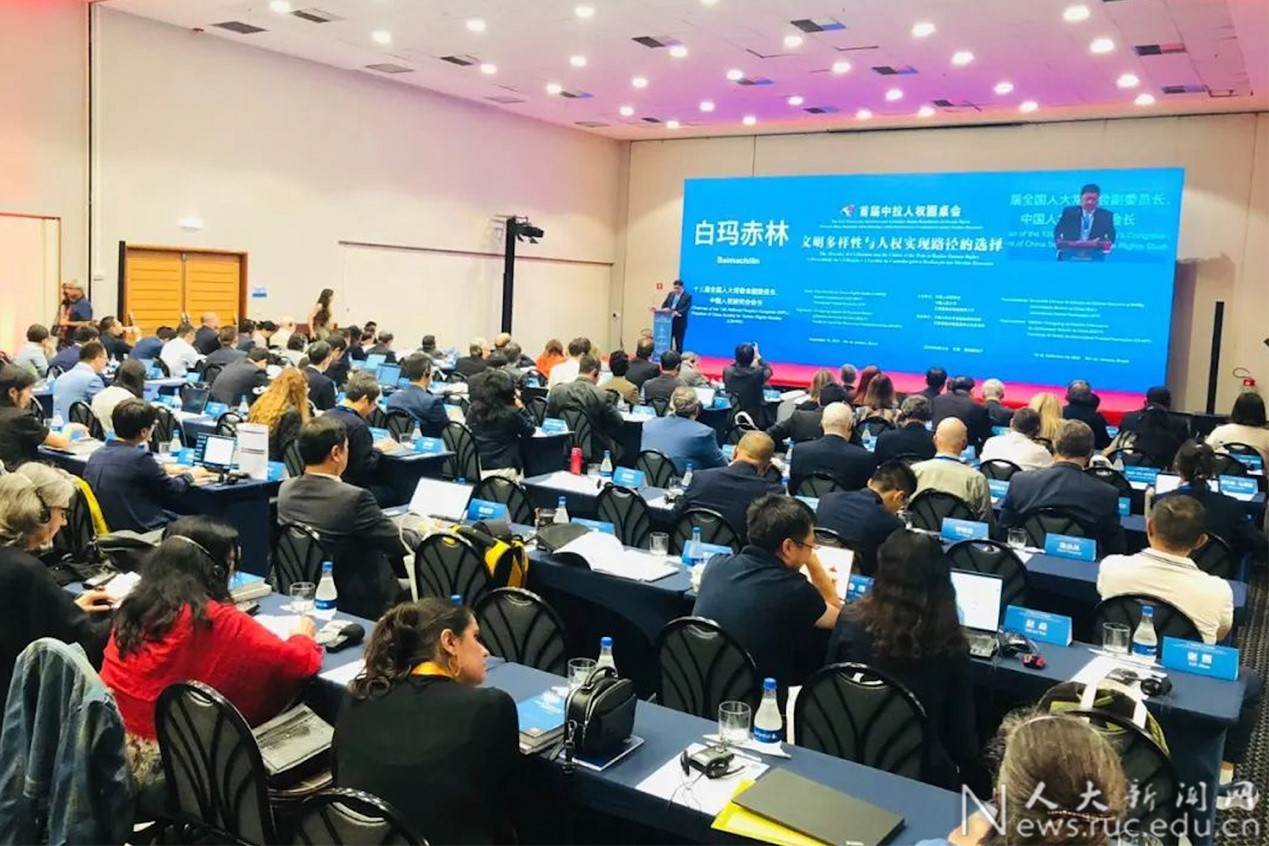The inaugural China-Latin American and Caribbean States Roundtable on Human Rights took place recently in Rio de Janeiro, Brazil on Sep. 10th.
Jointly organized by the China Society for Human Rights Studies (CSHRS), Renmin University of China (RUC), and Fluminense Federal University (UFF), this event marked the first mechanism-based exchange on human rights between China and Latin American and Caribbean (LAC) countries. It was co-hosted by RUC's Chongyang Institute for Financial Studies and the Faculty of Law at UFF.

Themed " The Diversity of Civilizational and the Choice of the Path to Realize Human Rights," the roundtable brought together over 120 participants from 17 countries, including high-ranking officials, human rights experts, scholars, think tanks, and media representatives from China, Brazil, Argentina, the Bahamas, Bolivia, Chile, Cuba, the Dominican Republic, Ecuador, Grenada, Mexico, Panama, Paraguay, Peru, Trinidad and Tobago, Uruguay, and Venezuela.
In his opening remarks, Baima Chilin, Vice Chairman of the Standing Committee of the 13th National People's Congress and President of CSHRS, noted that since the 16th century, Chinese and Latin American civilizations have fostered deeper exchanges and collaboration. Under the initiative of building a community with a shared future, China and LAC countries have found increasing alignment in their human rights concepts, each following unique paths. He called for the two regions to embrace a common security vision, jointly promote peaceful human rights environments, and respect diverse human rights philosophies through dialogue, cooperation, and shared global challenges.
Zhu Qingqiao, Chinese Ambassador to Brazil, emphasized the progress LAC countries have made in areas such as stability, economic revitalization, and social development in recent decades. He noted that this shared experience presents vast opportunities for human rights cooperation between China and LAC. Zhu highlighted China's commitment to improving human rights through high-quality development and emphasized the mutual benefits of continuing human rights dialogue.
Mônica Savedra, Pro-Rector of Postgraduate Research and Innovation at UFF, stressed the university’s active engagement in Chinese studies and its commitment to advancing international cooperation, especially with BRICS nations, in areas such as human rights and constitutional law.
Charles Peter David, former Foreign Minister of Grenada, praised the China-LAC partnership as a model for how global cooperation can significantly improve human rights and quality of life. He also acknowledged the challenges that remain, including environmental sustainability and civil rights, urging continued focus on these issues.
Wang Yi, Vice President of RUC, noted China’s continuous efforts over the past decade to incorporate human rights into its legislative, judicial, and law enforcement systems, highlighting the need for joint global efforts to address human rights development.
Gustavo Pacheco Villa, President of the Peruvian Institute of International Governance, stated that China, along with Latin America and the Caribbean, has made significant contributions to the field of human rights. He emphasized that Chinese culture has left a profound mark on the development of human civilization over millennia. Currently, human rights governance faces challenges such as war, food security, and environmental protection. Pacheco Villa called for a collective effort to address these challenges and work together to create a better "community of shared future."
The conference featured keynote speeches by experts from institutions across China and Latin America, including the North West University of Political Science and Law, the Inter-American Commission on Human Rights, and the University of Panama, among others.
Three parallel forums were held in the afternoon, focusing on topics such as the contribution of China and LAC to global human rights, the realization of development rights, and the current challenges in global human rights governance.
To conclude the event, Renmin University’s Chongyang Institute released a multi-language think tank report, "Common Goals: China-Latin America and the Caribbean Cooperation on Human Rights Development, The Present and the Future." This report outlines future cooperation opportunities and highlights the importance of dialogue in advancing shared human rights goals.

In celebration of the 50th anniversary of diplomatic relations between China and Brazil, RUC's Chongyang Institute and the Faculty of Law at UFF signed a Memorandum of Understanding (MoU) to promote academic exchanges and collaborative research on civilizational mutual learning.
The event was widely covered by media outlets, including People's Daily, Xinhua News Agency, China Daily, Global Times, and Brazilian Forum Magazine, among others. The roundtable reaffirmed the crucial role of China-LAC cooperation in advancing human rights as part of the broader "South-South Cooperation" initiative, with promising prospects for the future.



